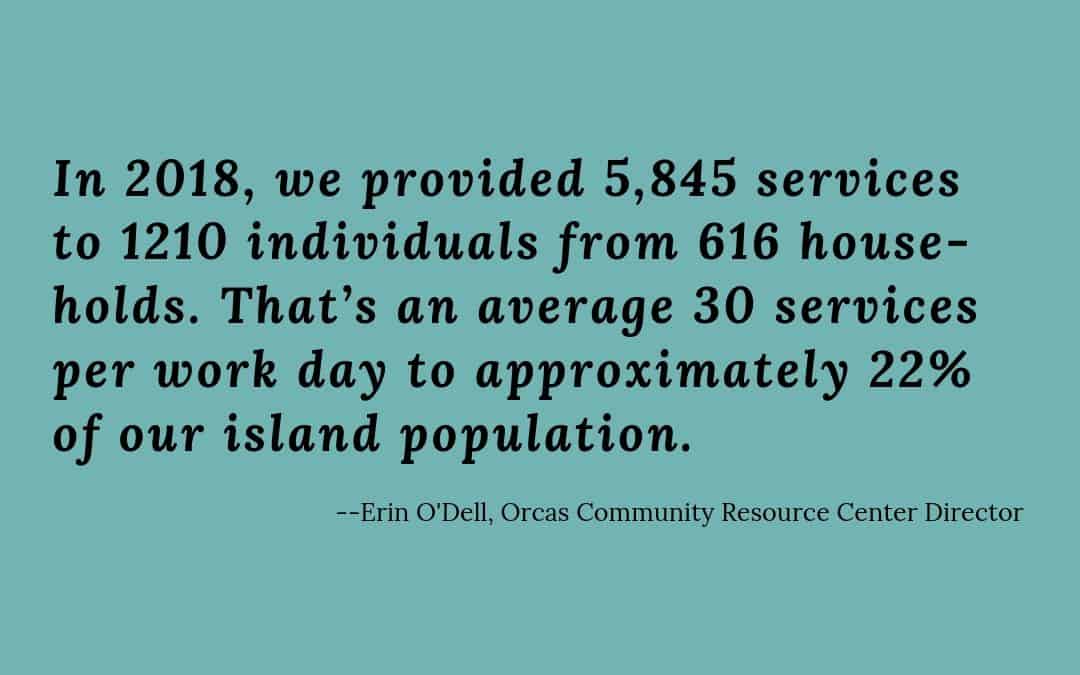Every once in a while, I get a glimpse of the impact OICF grants has on the community. This past week, I ran into a fellow sitting on his (very own) lawn reading a book in the sunshine. He looked so happy and healthy that I almost did not recognize him as the same person who lived for years in a tent in the woods no matter the weather or season. While OICF did not directly get him housed, there is no doubt that GiveOrcas grants helped build the capacity of the Orcas Community Resource Center to make it possible.
Over the last four years, the Orcas Community Resource Center has more than doubled its capacity to serve islanders. Each year, an OICF grant enabled us to continue to develop a process for helping islanders with complex needs – often of long standing – resulting in the permanent housing of a number of individuals who had been homeless for years. We have moved beyond providing simple information and referrals to helping islanders access a wide range of services and move towards self-sufficiency. We are now becoming a sustainable organization that can permanently deliver on our goal of helping people open doors and move through their current problems and circumstances to improved quality of life, ability to advocate for themselves, and increased self-esteem.Thanks to OICF, the Resource Center now occupies an attractive, welcoming space right in town that is staffed by people who remember your name. Last year we were responsible for generating over $150,000 in direct services to islanders, this number does not include the priceless value of helping people secure health insurance, counseling, housing, food stamps, supplemental security income, and Veterans benefits – to name a few. The 2018 grant from OICF has sustained the caring and qualified staff who provide direct client services while the OCRC Board works to increase our donor base to permanently meet operational costs that are not covered by reimbursements from government contracts. It has helped us keep our doors open to islanders in need of essential social services while we finalize the work of building a sustainable future for our operations.
Nearly 40% of Orcas Islanders cannot afford basic necessities of life. Almost 50% of our public-school students qualify for free or reduced lunches. Many families and individuals pay rents that are over 50% of their income. Financial problems cause stress. Stress reduces quality of life and can result in depression, illness, family disruption, and substance abuse – a vicious circle that prevents people from thriving and effects our whole community. These problems have been identified by multiple community organizations. Where can people turn for practical, substantive help? The Resource Center exists to serve people with problems in the areas of income security, housing, behavioral/primary health, transportation, inability to access veterans and disability benefits, and more.
In 2018, we provided 5,845 services to 1210 individuals from 616 households. That’s an average 30 services per work day to approximately 22% of our island population.With funding from OICF, San Juan County, the Opportunity Council, and other private donations, we were able to help 23 people stay in their homes and 12 gain housing stability through our Rental Assistance Programs. The Emergency Assistance Program funded in 2018 by OICF helped 109 households. As of June 30, 2019, we have served 68 households through this fund In 2019, this critical program will continue with funding by Satterburg, Coates and OICF grants.
In 2019, we are also proud to launch a new Household Essentials Program named the Coates Cupboard. Funding from the Coates foundation for 2019 has allowed us to expand our capacity to serve low income islanders with critical cleaning and personal hygiene items that cannot be purchased with an EBT card and not found at the food bank. There are currently 82 households enrolled in the Coates Cabinet Program. The Spring 2018 grant from OICF ensured that we have had the necessary funding to sustain operations through the year and in to 2019 while we continue to plan for the future of our organization in service to the Orcas community.

